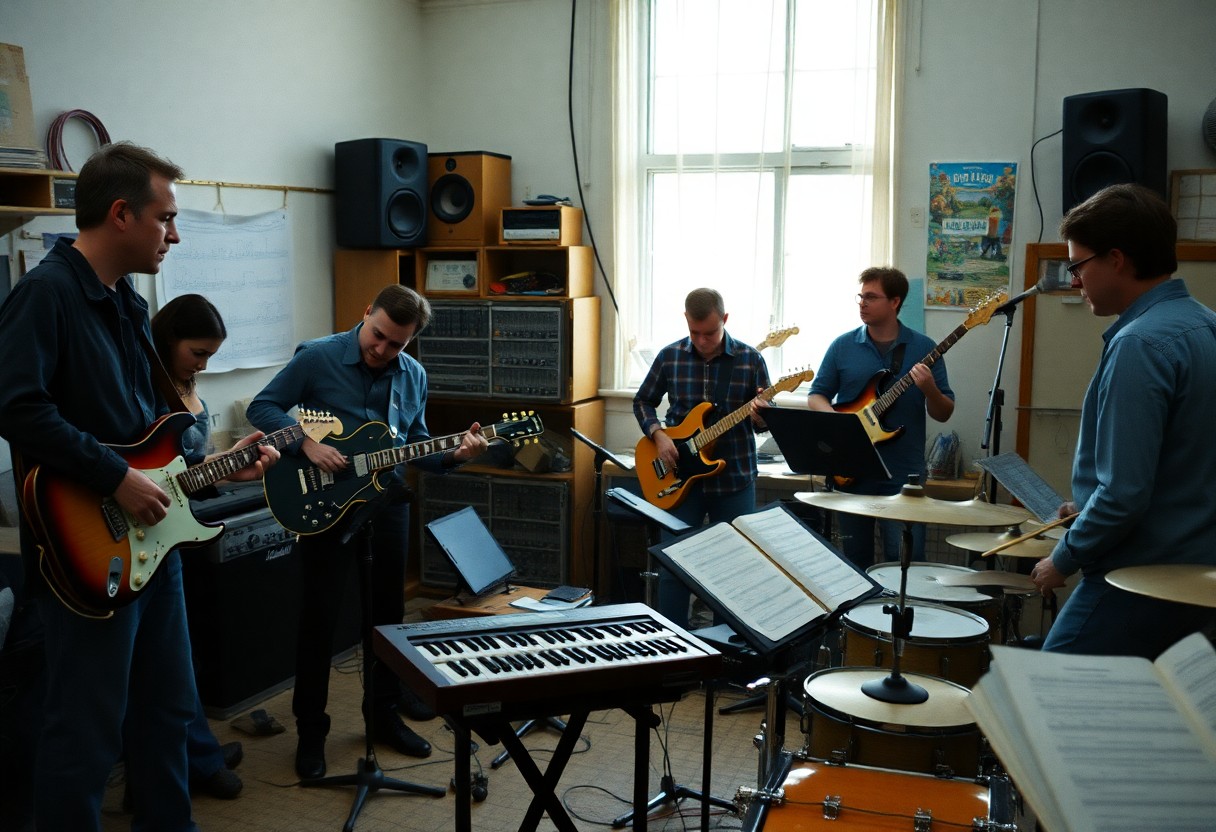Just as a well-tuned instrument is vital for creating harmonious music, skill development workshops are integral for enhancing your band’s overall sound. These workshops provide you with the opportunity to learn from experienced professionals, expand your technical abilities, and foster teamwork among your bandmates. By actively participating, you can unlock new levels of creativity, reduce potential conflicts, and create a more polished and cohesive performance. Investing in these experiences will not only refine your skills but also elevate your band’s musical journey.
Key Takeaways:
- Skill development workshops provide structured learning, allowing band members to enhance their technical abilities and musical knowledge.
- Collaborative practice in workshops fosters teamwork and communication, strengthening the overall cohesion of the band.
- Exposure to different musical styles and techniques during workshops can inspire creativity and innovation in a band’s sound.
- Workshops often introduce valuable tools and resources that help bands refine their sound and improve their performance quality.
- Engaging with experienced instructors and mentors during workshops can result in new insights and constructive feedback for the band.
- Participating in skill development can build confidence among band members, encouraging them to take risks and explore new artistic directions.
- Regular attendance to workshops creates a culture of continuous improvement, vital for evolving the band’s musical journey.
Understanding the Fundamentals of Band Performance
Before you can elevate your band’s sound, it’s imperative to grasp the fundamental elements of performance. These basics serve as the foundation for your group’s cohesiveness and overall musicality. Understanding these components creates a pathway for effective collaboration, enhancing not just your individual skills but your band’s synergy as a whole. Mastering these fundamentals will lead to a tighter sound and better communication during performances.
Rhythm and Timing Precision
Between individual flair and collective harmony, rhythm and timing precision is the beating heart of your band’s sound. It ensures that each member locks into the same groove, avoiding the chaos of disjointed timings. This synchronization will elevate performances, making your music resonate with audiences on a deeper level.
Instrument-Specific Techniques
InstrumentSpecific techniques are vital for maximizing the potential of your band’s sound. Each instrument has its own set of techniques that can greatly enhance your overall performance. From mastering complex fingerings on a guitar to understanding breath control on a wind instrument, each approach plays a significant role.
Due to the unique characteristics of your instrument, it is imperative that you focus on developing specific techniques that can enhance your performance. For instance, if you play guitar, honing your fingerpicking skills or learning to use a metronome can increase your timing accuracy. For drummers, practicing rudiments and dynamic control can lay the groundwork for powerful performances. By concentrating on these instrument-specific techniques, you not only benefit your skills but also contribute significantly to the band’s overall cohesion, leading to a richer and more polished sound.
Group Dynamics and Communication
Some musicians underestimate the importance of group dynamics and communication in enhancing their band’s sound. Your ability to effectively communicate within the group fosters a seamless collaboration, while also elevating the overall performance. Understanding each member’s strengths and weaknesses allows for better synergy and creativity, ultimately impacting your sound in profound ways.
Non-Verbal Communication During Performance
The connection you share with your bandmates often transcends words. Non-verbal communication, such as eye contact, body language, and facial expressions, plays a vital role during performances. These subtle cues help you synchronize your playing and maintain a dynamic interaction, leading to a more engaging and cohesive show.
Ensemble Cohesion Strategies
During rehearsals and performances, developing strategies for ensemble cohesion can significantly enhance your band’s sound. Consistent practice, active listening, and regular feedback among members contribute to a unified musical experience. Establishing a clear understanding of each part ensures seamless transitions and allows you to respond dynamically to one another. This shared musical language not only improves the quality of your sound but also fosters a supportive atmosphere where creativity can thrive.
Communication is the backbone of effective ensemble cohesion. It allows you to align your vision and expectations, paving the way for smoother rehearsals and performances. When each member contributes insights while actively listening to one another, you create an open environment that encourages experimentation and growth. This kind of dialogue strengthens the group, solidifying trust and enabling you to navigate the inevitable challenges that arise during live performances or practice sessions. Ultimately, prioritizing communication leads to a more powerful and unified sound for your band.
Sound Engineering and Equipment Mastery
To enhance your band’s overall sound, understanding sound engineering and mastering your equipment is vital. These skill development workshops not only introduce you to the technical aspects of audio production but also empower you to manipulate sound frequencies, achieve optimal sound mixing, and apply various sound effects that can elevate your music. Cultivating these skills will enable you to create a professional-grade sound, ensuring that your performances resonate with audiences.
Basic Audio Production Skills
Engineering your sound begins with a firm grasp of basic audio production skills. Understanding concepts like signal flow, tracking, and mixing is important for any musician. These foundational skills will allow you to record your music effectively, ensuring each track maintains its integrity and contributes positively to your overall sound. Additionally, learning how to use digital audio workstations (DAWs) equips you with the tools necessary for innovative sound design and manipulation.
Equipment Maintenance and Operation
The performance of your band greatly relies on the proper maintenance and operation of your audio equipment. Understanding how to care for your instruments and gear can prevent issues that may disrupt your rehearsals or performances.
Due to the complex nature of sound equipment, maintaining it properly is often overlooked. Your gear can experience wear and tear due to regular use, leading to potential malfunctions if not addressed. It is important to routinely check cables, microphones, and audio interfaces, as damaged equipment can result in poor sound quality and even increased risks of electrical hazards. Regular maintenance ensures your equipment operates at its best, contributing positively to your band’s sound. Whether it’s cleaning connections or replacing fragile components, taking these steps fosters reliability and performance consistency during your shows.
Professional Development Through Workshops
Now, participating in skill development workshops offers musicians an excellent pathway for professional growth. These workshops provide you with a structured environment where you can enhance your technical abilities, boost your creativity, and learn best practices from seasoned professionals. Engaging actively in these experiences not only refines your skills but also elevates your overall sound as a band.
Industry Expert Guidance
Through workshops, you gain direct access to industry experts who are eager to share their knowledge and experiences with you. Their insights can help you navigate challenges, refine your style, and develop a unique sound that stands out in a competitive music landscape.
Networking Opportunities
About attending workshops, you unlock numerous networking opportunities that can be pivotal for your band’s growth. Connecting with fellow musicians, producers, and industry professionals opens doors to collaborations, gigs, and vital resources that can help you elevate your music career.
A strong network can buffer your music journey against unforeseen hurdles. Building relationships within the industry not only allows you to collaborate with other talented artists but also enables you to tap into valuable resources and expertise. Each connection made can lead to potential gigs, mentorship opportunities, or even record deals, reinforcing the significance of making your presence known at workshops.
Practice Techniques and Methods
All musicians benefit from a variety of practice techniques that ultimately contribute to enhancing your band’s sound. Incorporating methods like scale practice, ear training, and improvisation exercises encourages growth in both your individual skills and group cohesion. Experimenting with different approaches can help you identify what resonates best with your band, leading to a richer and more harmonious performance.
Structured Rehearsal Planning
On planning your rehearsals in a structured manner ensures that each session is productive and focused. By outlining specific goals, practicing particular songs, and allocating time for both individual and group practice, you can significantly improve your band’s efficiency and overall sound. This approach not only maximizes your practice time but also allows you to track your progress and coordinate better as a unit.
Individual and Group Exercise Programs
To create a well-rounded skill development platform, implement individual and group exercise programs. This allows you to work on your personal abilities while fostering a strong sense of teamwork within your band. Individual exercises enhance your instrument mastery, while group activities encourage collaboration, timing, and musical arrangements that are necessary for a polished performance.
Hence, when crafting your individual and group exercise programs, focus on promoting diversity in the techniques you incorporate. Engage in solo practice sessions that challenge your technical skills, and complement these with collaborative sessions designed to foster communication and adaptability among band members. Utilizing both approaches enables you to strengthen your abilities while enhancing your band’s unity. Balancing personal and group practice is vital for achieving a well-rounded sound that captivates your audience.
Performance Enhancement Strategies
Despite the natural talent within your band, performance enhancement strategies are vital for elevating your sound. Engaging in skill development workshops allows you to fine-tune your techniques, foster creativity, and establish effective communication among band members. This shared learning experience can yield a cohesive sound that captivates your audience.
Stage Presence Development
Between rehearsals, mastering your stage presence can set you apart from other bands. Developing your charisma and confidence while performing can enhance your connection with the audience. This helps to create an unforgettable experience that keeps fans engaged and coming back for more.
Live Sound Management
Before stepping onto the stage, it’s important to understand live sound management and how it affects your performance. Improper sound levels can hinder your music’s reception, leading to a less-than-stellar show.
In addition to sound levels, being aware of feedback issues, monitor placements, and the overall acoustics of the venue is necessary for a successful performance. Your sound engineer plays a significant role in this process, so maintaining open communication is key. If you neglect live sound management, you risk diminished audio quality, which could leave a negative impression on your audience and hinder your band’s growth. Prioritizing this aspect not only enhances your performance but also boosts audience satisfaction.
Conclusion
With this in mind, participating in skill development workshops can significantly elevate your band’s sound. These workshops provide you with expert guidance, practical techniques, and new perspectives that inspire creativity and collaboration among members. By refining your individual abilities and fostering a deeper understanding of music, you’ll not only improve your performances but also create a more cohesive and polished final product. Investing time in these workshops is an investment in the musical journey of you and your band, leading to richer experiences and memorable performances.
FAQ
Q: Why should my band participate in skill development workshops?
A: Participating in skill development workshops can significantly enhance your band’s overall performance. These workshops provide structured learning experiences led by industry professionals who share crucial techniques and insights. They can help band members improve their musicianship, such as mastering their instruments, understanding music theory, and refining vocal techniques, which ultimately leads to a richer and more polished sound.
Q: How do skill development workshops improve collaboration within a band?
A: Skill development workshops foster teamwork and communication among band members. Through collaborative exercises and group-focused activities, musicians learn to better listen to each other, adapt their playing styles, and develop a unified approach to music-making. This collaboration can enhance the band’s chemistry and ensure that all members are aligned in their musical vision, contributing to a more cohesive sound.
Q: Can skill development workshops introduce new musical styles to my band?
A: Yes, these workshops often expose bands to a variety of musical styles and genres. By working with different instructors and participating in diverse activities, band members can explore new techniques and influences that can be integrated into their own music. This experimentation can lead to innovative sounds and fresh material, allowing the band to stand out in a competitive music landscape.
Q: What kind of skills can my band expect to develop during these workshops?
A: Skill development workshops cover a wide range of areas, including instrument mastery, songwriting, composition, arrangement, and performance techniques. Additionally, members can work on stage presence, audience engagement, and even aspects of music production. These skill sets are vital for elevating the quality of your band’s sound and overall performance.
Q: How do skill development workshops help with overcoming performance anxiety?
A: These workshops often provide techniques for managing stage fright and improving self-confidence during live performances. By participating in mock performances, receiving constructive feedback, and learning relaxation techniques, musicians can build their comfort level on stage. This preparation ensures that when it comes time to perform, members are more at ease, allowing their true musical abilities to shine through.









